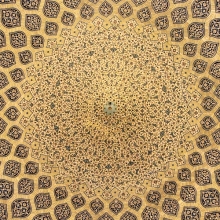Department of Near Eastern Languages and Civilizations Renamed Middle Eastern Languages and Cultures

The Department of Middle Eastern Languages and Cultures (MELC) is the new name for the department known since 2005 as the Department of Near Eastern Languages and Civilizations (NELC). After a lengthy discussion by faculty, lecturers, and staff, as well as consultation with graduate and undergraduate students, the department voted in December 2022 in favor of changing its name. The change was approved by the School of Arts & Sciences in 2023 and became official on July 1, 2024. All courses previously rostered under NELC are now MELC courses.
The process began under Professor Paul Cobb, when he was Department Chair. The next Chair, Professor Heather Sharkey, continued its progression with the department’s rebranding committee and staff. Professor Josef Wegner, who took over as Department Chair in July, now holds the role as first chair of MELC.
“Although the change of N to M in the acronym may seem minor,” Wegner says, “the broader recognition of the ‘Middle East’ over the more restrictive ‘Near East’ was considered as a better fit for the numerous cultures and languages encompassed by teaching and research in the department.”
Cobb adds that the word “civilizations” did not adequately reflect the tremendous historical and social complexity of the Middle East over thousands of years, or how that is represented in research and teaching at Penn. “The word suggests that only those social groups that can be designated ‘civilized’ are worthy of study and does not signal our interests in, for example, nomadism, animals, rural life, or languages and literatures outside courtly or elite spheres,” he says. The change to “cultures” recognizes this complex variety of human experience in the broader Middle East, as well as the focus of the department on teaching both ancient and modern languages.
Further, says Cobb, “we felt that we simply did more in NELC than ‘Languages and Civilizations’ would indicate.” Research and courses cover the region from North Africa and the Iberian Peninsula through the eastern Mediterranean to Iran and Arabia, as well as social and cultural development from ancient to modern times.
“Our faculty teach and research on diverse disciplines across the ancient, medieval, and modern periods that include language, literature, archaeology, anthropology, philology, historic preservation, religion, philosophy, history of art, history, folklore, legal history, and cinema and media studies, to name the most prominent,” Wegner says. The department offers ancient languages including Sumerian, Akkadian, Biblical Hebrew, and Egyptian, as well as modern languages including Persian, Turkish, Hebrew, Arabic, and Kurdish.
Given the department’s scope, other names considered were Middle East Studies, Middle East and North Africa, and Middle Eastern Societies and Cultures. The option of Middle Eastern Languages and Cultures emerged as a clear faculty favorite. Students were split over the various name options, although were heavily in favor of renaming the department, and unanimous in the change from Near East to more broadly recognized Middle East.
“Keep in mind that our department has had many names in its history: Oriental Studies, Asian and Middle Eastern Studies, NELC, and now MELC,” says Cobb. “One of the lessons we learned through this process is that no one name is perfect. But MELC has the advantage of being the result of a slow and consultative process and, better than any other name, communicates to as broad an audience as possible what it is this fantastic department does.”





